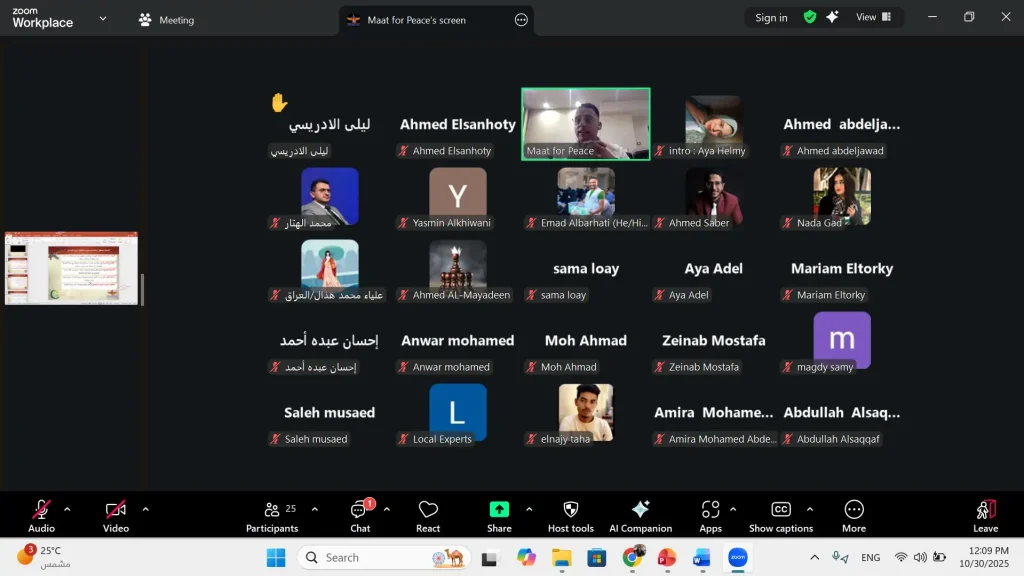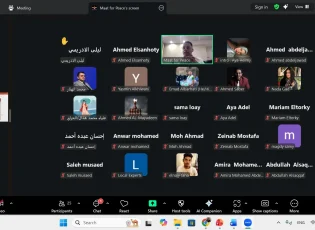Maat organizes a symposium on religious tolerance and the universal periodic review mechanism
Aqeel: Spreading religious tolerance begins with individuals, and the houses of worship, the media and educational institutions must raise awareness of the rejection of violence and intolerance
The pastor of the church, Rev. Dr. Gerges Awad: Recognition of sectarian violence is the first step in resolving the crisis
Maat Foundation for Peace, Development and Human Rights concluded yesterday evening a symposium entitled Religious Tolerance and the Universal Periodic Review Mechanism With the participation of a large number of people from the Al-Zawia Al-Hamra area in Al-Nour city, this symposium comes within the framework of the Foundation's interest in helping the Egyptian state to fulfill its voluntary pledge to the universal periodic review mechanism, and out of its keenness to integrate the different regions into efforts that focus on the universal periodic review as an entry point for improving public policies. And achieving human development in its comprehensive sense, especially with regard to spreading a culture of religious tolerance, acceptance of others and freedom of belief.
It is worth noting that Egypt fully accepted 223 recommendations out of the 300 recommendations that were submitted to it by the member states of the Human Rights Council during the second session of the review in 2014 and rejected 23 recommendations and partially accepted 24 while it took note of 29 recommendations and considered one inaccurate recommendation. The recommendations accepted by Egypt are several recommendations related to spreading the values of religious tolerance and freedom of belief, which revolved around taking more steps to ensure the promotion of the values of tolerance, dialogue and mutual understanding at the local level, encouraging initiatives aimed at promoting respect, religious tolerance and cultural diversity, and promoting social dialogue aimed at producing a religious discourse. It supports the values of tolerance, social cohesion and mutual understanding, strengthening the protection of the rights of religious minorities, in particular creating the necessary conditions to exercise freedom of worship, putting an end to impunity for violations of these rights, ensuring respect for freedom of religion or belief for all its citizens, and launching a social dialogue to improve religious discourse by emphasizing values Positivity and the bright model of the Egyptian religious heritage.
The symposium, organized by Maat Foundation in cooperation with the Evangelical Baptist Church in Shubrā and under the patronage of the Church's pastor, Rev. Dr. Gerges Awad, aimed to hear the complaints of citizens who suffer with some service and social problems related to the recommendations of the universal periodic review.
The most important points around the meeting were the absence of law enforcement in cases in which one of the parties is a Christian, and the resort to customary sessions to resolve any crisis. The Church Pastor demanded the state recognize that there is sectarian violence against Christians in Egypt, calling on the state to change a policy. I do not listen, I do not see, I do not speak. Towards Christians, demanding law enforcement without discrimination.
The discussion also revolved around the abolition of the religion section from the personal identity card, the amendment of educational curricula and the abolition of religious education in public schools, and work with the Al-Azhar Foundation to implement awareness programs that work to spread the tolerant values of Islam, tolerance and acceptance of others.
The discussion concluded that the majority of Egyptian society in general suffers from violence towards children, women and men as well, not just religious violence. As well as intolerance and not resorting to dialogue.
In this regard, Ayman Aqil, President of Maat Foundation, affirmed the foundation's support for any activities aimed at spreading the culture of peace and dialogue and the rejection of violence and intolerance, adding that there are social factors that have led to the demise of human relations and the violence that results from a large societal failure.
Aqeel explained that the different concepts have led to fanaticism and that the state alone will not be able to solve the issue in light of the conditions the country is going through, stressing that citizenship is the solution, and civil society organizations must work strongly and quickly with those with extremist ideas to review their ideas in order to reject violence. Stressing that spreading religious tolerance begins with individuals, and places of worship, media and educational institutions must raise awareness of the rejection of violence and intolerance.
Aqeel called on everyone to work to implement the recommendations of President Abdel Fattah El-Sisi to continue efforts and endeavors to spread the true religion, correct the religious discourse and define the true essence of Islam that promotes tolerance, compassion, acceptance of others and the realization of reason, which is completely inconsistent with claims of murder, destruction, sabotage, and blind obedience. Reconcile the entire community.
shortlink: https://maatpeace.org/en/?p=14585















